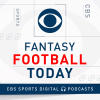For many, the reality of the coronavirus pandemic hit when sports came to a stop. The severity of the virus, how quickly it can spread and the danger it has for particular groups, such as the elderly or other high-risk individuals, caused leagues and tournaments to postpone or completely cancel games and seasons.
Coming to the conclusion to halt sports all together was not a decision that was made immediately. At first, games without fans appeared to be the solution to keeping the public safe while also continuing to hold the events. But soon, it became clear that even that solution was not enough.
CBS Sports spoke to Dr. E Hanh Le, MD Senior Director, Medical Affairs at Healthcare Website, about why certain decisions surrounding sports were made and what the future for attending sporting events could be.
Dr. Le said when she first saw that no fans would be allowed she found it "very interesting."
On the one hand, there are pros because you are potentially decreasing the odds that there are going to be mass gatherings, particularly of older alumni, while also decreasing the number of employees, she explained. But on the other hand, you're not decreasing referees and players being around each other, and they could contract the virus and bring it back to their families or in to the public.
Athletes generally being younger and not in the demographic of those hit hardest by coronavirus complications "made it seem like a viable option at the time," she said. But it is about more than just thinking about yourself or one group of individuals at a time like this.
"What can I do as a good citizen, what can I do as a good coworker, what can I do as a good family member to protect myself?" is what everyone's thinking should be, Dr. Le said. Social distancing is "the key to all of that," she explained.
Still, having people stay away from social situations, specifically large sporting events, is a lot easier said than done.
From Dr. Le:
"It's one thing to say you should all take responsibility for social distancing but then at the same time set up these scenarios that make it very hard to do that because everybody, they're like, 'Well I have tickets to March Madness that I'm super excited about, how can I not go?'"
In explaining why it's smart that most games have been canceled, Dr. Lee said that with something like the NCAA Tournament, closing doors to fans during games would still mean spectators gathering in large quantities to cheer on or celebrate their team.
"The game is more than just the game in the arena," Dr. Le said. "There's always a potential risk even if we do decide to move forward in the future and have the games be in empty arenas."
When games could resume in the major North American sports leagues is currently unknown. But even when games do resume, Dr. Le explained that serious precautions will need to be taken.
"If there's still a risk of high transmission in the community and we don't have a good treatment for it, that would still be a risk for the future," Dr. Le said.
And even if games are set to resume -- with or without fans in the stand -- should athletes feel safe?
"Are their players going to want to play and are their fans going to want to show up? Because if you feel like your players, who are the healthiest, sturdy population don't want to go, then you as a regular person would not be so inclined to want to go to a game," Dr. Le said.
What it comes down to -- even when life goes back to normal -- is that the sports world is about way more than just the athletes and coaches. Think about how many people you interact with when attending a live event at a crowded arena. How many people bump into you? How many vendors do you buy drinks and food from? How many surfaces do you touch?
As Dr. Le explain, we now have a "new normal." For now, that means no sports. For the future, that means continuing good infection control measures and hygiene once it becomes safe to return to games.














